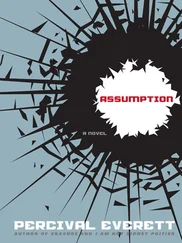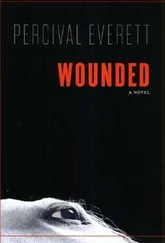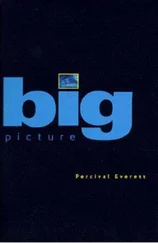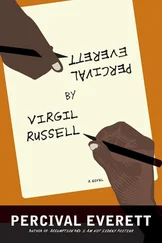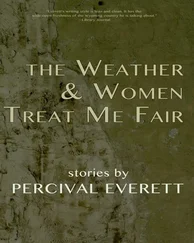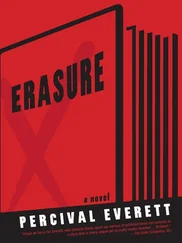I push on into the mouth of the river and on to Portland. I stop in Portland. I dock the boat and leave it and I’m walking through the city of Portland with my saxophone, my phonograph, my record, my bat, and now a briefcase full of money.
Ma walked into my room with her head bowed. I was sitting on my bed, looking at my model plane. Ma sat beside me. She didn’t look at me.
“Grandmama’s dead,” she said.
“What?”
“Grandmama’s dead.”
I tried to look at Ma’s eyes. I could see a tear working its way down her cheek. Grandmama and Ma were close until Ma started acting so crazy. Then Grandmama just sorta stayed away ;all of Ma’s people did. Daddy didn’t have any people. His twin brother got run over by a coal truck in Birmingham. He was the last. Ma grabbed my hand and squeezed it. “It’s okay,” I said.
“You’re a good boy, Craigie.” I was getting tired of hearing her say that.
“It’s okay,” I repeated.
She put her arm around me and pulled me close against her coat. I began to perspire immediately. She cried harder.
Later, Martin and I were in our navy blue suits in the back seat of the car. We were on our way to Watkins Funeral Home. It was the largest black-owned business in Fayetteville. Pernell Watkins also owned a wig shop, which his wife operated. Everyone wondered about the wigs in that shop. Especially since Joey Fields looked in the window of the shop, saw a wig, and swore up and down that it was the hair of his dead wife, Jenny Mae. The controversy grew because Jenny Mae Fields’s funeral had been a closed-casket affair. As we pulled to a stop in front of the funeral home I began to wish I was back home at the piano with Bud.
We entered the funeral home and Grandmama’s body was laying out in a coffin in this dimly lit room. Ma’s brother and her two sisters were there. Aunt Cleo and Aunt Edna were screaming and carrying on and their husbands were holding them down.
I wandered away from the room, away from the crying, and into a large office. As I looked around I thought of Pernell Watkins, the funeral director. He was tall, slender, and light-skinned. It seemed like all funeral directors were light-skinned. In the office I saw a picture of the original Watkins, a dark-skinned guy. However, as I looked at the pictures of the descendants of the original Watkins, I saw that each Watkins was lighter in color than the previous one. I figured dealing with death had that effect.
I wandered from the office, down this long corridor, and I started feeling real scared because there was this weird music playing. I walked into this large room filled with caskets. Bronze, silver, pretty wood caskets. Big caskets, small caskets, wide caskets. I stopped to look closely at one light-blue casket. I ran my fingers along the golden handles. Then I saw some dirt around the edges of the coffin. Somebody grabbed me and I screamed. It was Martin.
“What are you doing?” Martin asked.
“Look here,” I said. “Dirt.”
Martin’s eyes opened wide. “He uses the same boxes again and again.”
We heard footsteps and we ducked down and scurried back to where Daddy was. We were shaking.
“What’s wrong?” Daddy asked.
Just then, Pernell Watkins came and stood by Daddy. Martin, who was about to talk, caught himself and grabbed Daddy’s arm and whined something about Grandmama. Daddy was really puzzled and he dropped a hand to Martin’s back. Martin looked at me and shrugged his shoulders.
I’m out on the streets of Portland, Oregon, and I ain’t ready to go home and I figure Sid will be looking for me, so I decide to stay put for a while. I’m in the Chinese section of Portland and I see this sign on a house advertising a room for rent. I ring the bell.
The door swings open and there’s a short, skinny Chinese man. “What can I do for you?” he asks.
“I’m here about the room,” I tell him.
“It’s a small room. Fifty dollars a week. I live here with three other men and there’s one bathroom.”
“I’ll take it.”
“Don’t you want to see it first?”
“No.”
He lets me in and leads me upstairs and down the hall to my room. It’s a small room, like he said, with a bed and a chest of drawers and a big, soft chair.
“I’m Quincy,” says the short man.
“Craig. Craig … Sutton,” I says. I reach out for his hand and he’s got long, cold fingers that wrap around my knuckles. “If you don’t mind, I think I’ll catch up on some sleep.”
“Bathroom’s at the end of the hall.”
“Thanks.”
Quincy leaves me and goes back downstairs and I walk into the room and fall onto the bed. I get up and decide to wash out my clothes before I sleep.
My eyes open and I get up and plug in my phonograph. It’s dark outside and I can hear talking. I stop the music and get dressed and go downstairs. There are three men with Quincy watching television in the living room and when I walk in they all stand up. There’s a fat man in jeans and a flannel shirt and two men dressed all in gray and they’re all Chinese.
Only the fat man extends his hand and Quincy tells me his name is Thomas. I take his hand and he smiles and I smile. The other two men are named Mike and Larry and they don’t push their hands out and they don’t smile.
“Let me show you the rest of the house,” says Thomas and this big fella slaps a hand on my shoulder and turns me around. When we’re out of the room he says, “Don’t let Mike and Larry bother you. They are just upset that Quincy didn’t discuss your moving in with us.”
“I could leave.”
“Don’t be silly.” He slaps me on the back and we’re in the kitchen. “Quincy makes breakfast for everybody, if you’d care for it.”
“Thanks.”
“There’s a beer in the fridge. Feel free.”
I nod. “Why are Mike and Larry dressed like that?”
“They’re in a Mao study group.”
“Oh.”
“More social than anything.” He pushes his fat fingers through his thick black hair. “Where are you from?”
“Spokane,” I tell him.
“Oh, yeah? How long do you plan to stay around here?”
“I don’t know yet.”
“Business?”
“Huh?”
“Business bring you down here?”
“No, uh … vacation.”
Thomas reaches into the refrigerator and pulls out a beer and offers it to me. I take it and he pulls out another one for himself. “You like baseball?” he asks.
“What?”
“Baseball?”
“It’s okay.”
“The Portland Beavers are playing tomorrow … if it doesn’t rain. Wanna go?”
“Sure.”
The following day I sleep until late morning and when I finally make it downstairs everybody is gone. So, I start digging through the icebox and I really have a taste for bacon, but there ain’t a scrap of meat to be found. There ain’t nothing in the refrigerator but yogurt and beer, so I have a beer. I go back to my room.
I’m upstairs in my room playing my saxophone and there’s a knock at my door and it’s Thomas.
“You still want to catch the Beavers?” he asks.
“What?”
“The baseball game.”
“Sure.”
We leave the house and walk about a mile to the stadium and pay a buck apiece to get in. It’s a real cloudy day, but it ain’t raining and that’s all that matters. Thomas and I head up the bleachers behind home plate and his leg goes through a gap between the boards. I reach down and catch him and his hand closes around my upper arm and he’s got his balance again.
“You’re very strong,” he says, slowly releasing my arm.
I don’t say anything. I just move up, grab a seat, and look out over the field. It’s funny; there’s a lot of folks out for the game, but we’re the only ones sitting behind home plate. I’m about to ask Thomas why we’re all alone where we are when I notice how low the screen is between the batter and the bleachers. I think that many a foul ball must have come whistling back into the crowd.
Читать дальше

